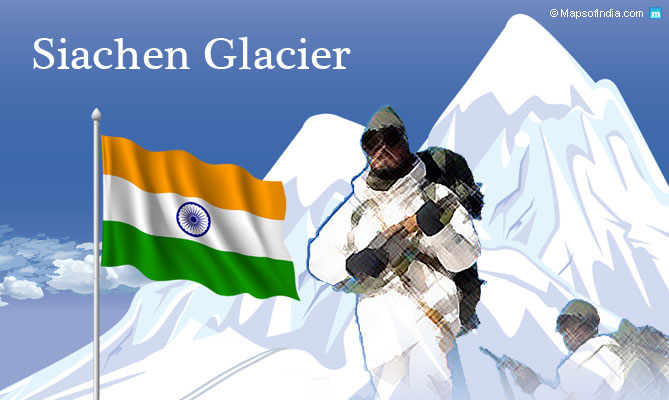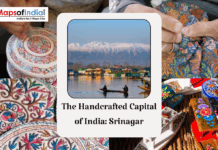
The recent visit of Narendra Modi, Prime Minister, to the base camp of Siachen Glacier was very well received by the people. Indeed, it was heartening to know that while the rest of India was busy celebrating Diwali in the comforts of their homes, in the company of their families, Modi decided to spend the day with the soldiers who sacrifice the pleasures of family life and celebration of festivals for the protection of our country.
The Siachen Glacier is located in the eastern Karakoram range in the Himalayan mountains. It has been termed as the third Polar region, being the second longest glacier in a non-polar region. At an altitude of 5,753 m (18,875 ft) above sea level, Siachen is the highest combat zone in the world, where the extreme cold claims more lives than bullets do.
An incredible amount of gumption, spirit and both physical and mental strength is required to stay atop the 76 km long glacier at a height of 18,875 ft. Life there defies the normal day-to-day mundane rules.
The life of a soldier in Siachen
A slow walk of 50 strides is enough even to have a well conditioned man gasping for breath and the muscles start trembling. Soldiers suffer from conditions varying from frostbites to hearing loss and damage to the eyesight. Merely touching the trigger or gun barrel for just over 15 seconds with bare hands can result in loss of fingers. The cold surface of the metal causes severe frostbite resulting in amputation of the part. In the most extreme cases the body part may just fall off. The glare of the white ice may also result in the loss of eyesight.
A mountaineer may rough it, trekking the higher reaches, for pleasure. But he does it in the best of weathers. But for the Indian soldier, climatic condition is not an option. He has to be there, sitting atop the Siachen Glacier, guarding the sovereignty of the nation, all round the year.
The human body cannot acclimatize itself after a height of 5,400 m. As a result, the soldier in Siachen starts facing health problems like sleep disorders, lack of appetite and the body starts deteriorating. To add to this eating out of tin cans for days on end, because fresh food is not available, also does take its own toll. With no communication with family and friends, the soldiers, who have to spend three months atop the glacier before they can go back to the base camp for recouping, remain alienated. It is a known fact that a soldier is never the same psychologically after a posting to the Siachen.
In the last 30 years, more than 800 soldiers have sacrificed their lives at the Siachen. Maj. Gen. V S Budhwar, an Indian commander in Leh, whose region included Siachen, had said, “Nobody can win, no matter how long we fight, but this is our land. It is a portion of our nation-state, and we will not cede it.” That is the spirit of the Indian soldier.
Snowfall can be well over three dozen feet
It has been aptly said that Siachen is Hell on Earth. It is where toothpaste freezes in the tube, where fruits and vegetables freeze to the extent that they can be dented with a hammer, where a snowstorm can continue for a period of three weeks and where snowfall can be well over three dozen feet.
I am one of the lucky few who had the honour of visiting the base camp of the Siachen Glacier. And as I stood on the banks of the river Nubra, with the black snouts of the Siachen Glacier all around me, I was at the same time completely mesmerized by the stark beauty around me, as well as scared of the message of death that this beauty was carrying along with it. I heard that many a time the bodies of soldiers who fall into crevices are recovered months or years later, frozen in time, in the glacier, when it melts into the Nubra river.
As I left the banks of Nubra, I had a prayer in my heart for the souls lost and a prayer for the families left behind. I realise that I am in the safe hands of the Indian army. As we go about doing our day-to-day mundane activities, the Indian soldiers are out there, braving the most extreme conditions, in all parts of India, to keep the people of India safe and sound. And this time when I said Jai Hind, I really knew what it meant. JAI HIND.




